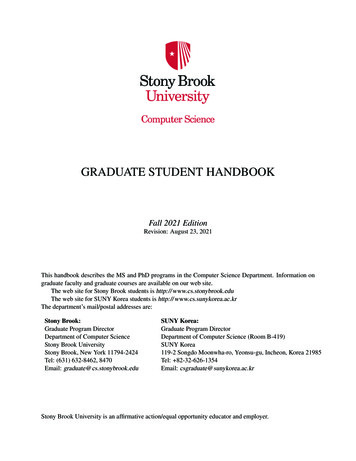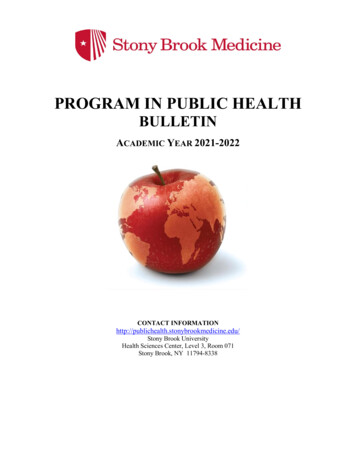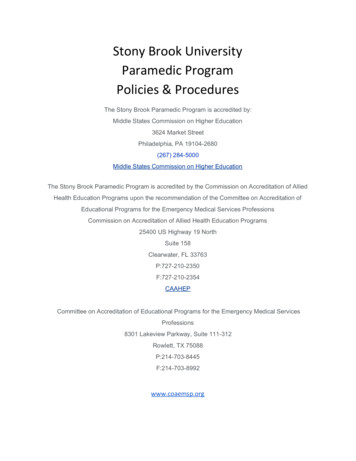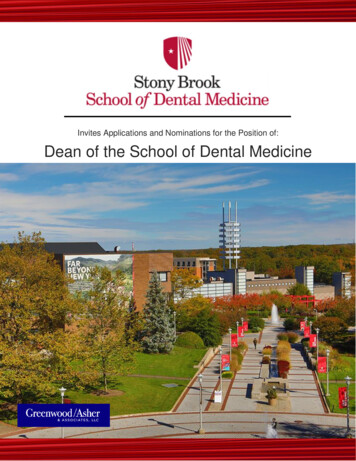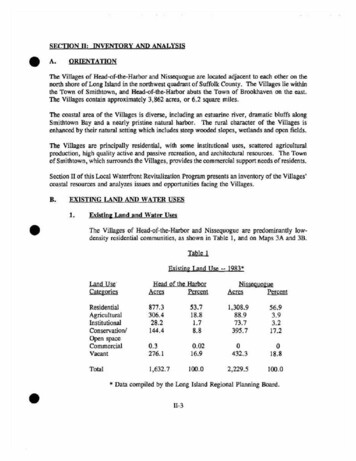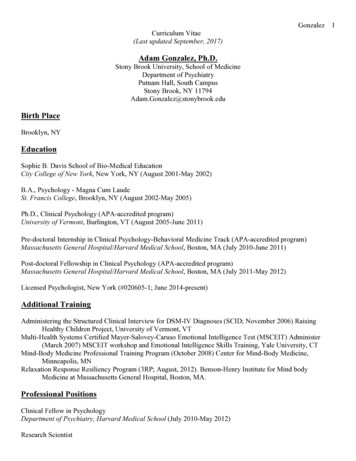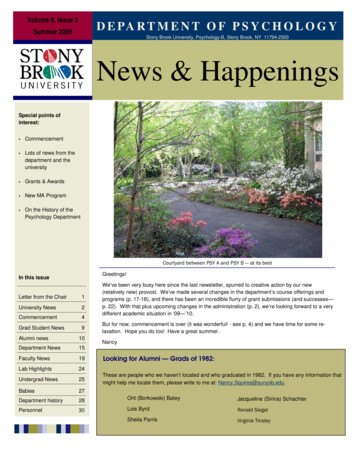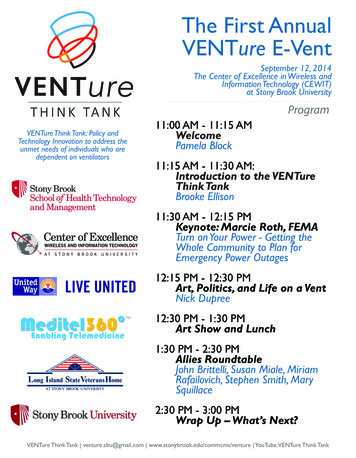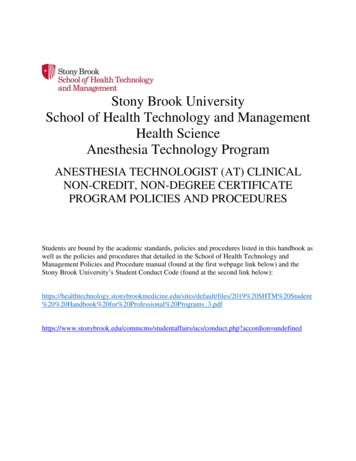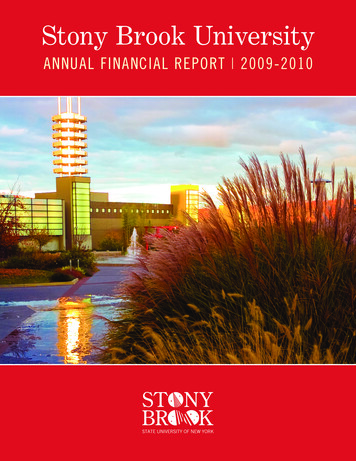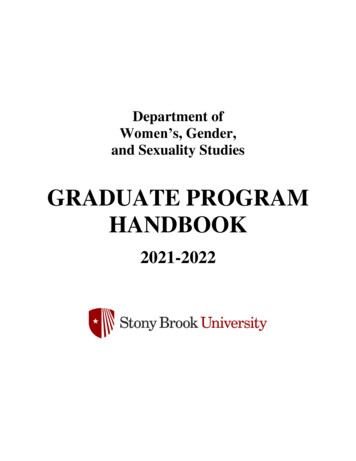
Transcription
Department ofWomen’s, Gender,and Sexuality StudiesGRADUATE PROGRAMHANDBOOK2021-2022
PREFACEKey Contact InformationDepartment Chair: Lisa Diedrich (lisa.diedrich@stonybrook.edu)Graduate Program Director: Liz Montegary (liz.montegary@stonybrook.edu)Contact the Graduate Program Director for help with all academic matters, includingcoursework, selecting advisors, and degree requirements.Graduate Program Coordinator: Jackie Donnelly (jacqueline.m.donnelly@stonybrook.edu)Contact the Graduate Program Coordinator for assistance on administrative issues, includingpayroll, registration, academic records, tuition scholarship, and filing for graduation.Important NotesThe Women’s, Gender, and Sexuality Studies Graduate Program Handbook serves as a guide tothe policies and procedures in the Graduate Bulletin. Any such policies and procedures in thishandbook are subsidiary to the Graduate Bulletin. The bulletin is the official documentrecognized by Stony Brook University. Students are responsible for reviewing, understanding,and abiding by the university’s regulations, requirements, and deadlines as described in officialpublications and calendars.The information in this handbook is subject to change. Over the coming year, you may be givena copy of any changes in departmental, college, or university policy and procedure as anaddendum. At the beginning of each academic year, a revised copy of the Graduate ProgramHandbook will be reissued as a PDF and distributed to all WGSS faculty and graduate students.ii
TABLE OF CONTENTSPROGRAM OVERVIEW1FAST FACTSWGSS MISSION STATEMENTGRADUATE LEARNING OBJECTIVESUNIVERSITY STRUCTUREDEPARTMENT STRUCTURE11223PH.D. REQUIREMENTS5AT-A-GLANCEGRADUATE COURSEWORKCORE COURSESELECTIVE COURSESHELPFUL HINTSTRANSFER CREDITSINTER-UNIVERSITY DOCTORAL CONSORTIUMTEACHING EXPERIENCEFOREIGN LANGUAGE REQUIREMENTCOMPREHENSIVE EXAMOVERVIEWEXAM COMMITTEEREADING LISTWRITTEN COMPONENTORAL COMPONENTEXAM OUTCOMESCLARIFICATION: EXAM & WGSS MA DEGREEPROSPECTUSDISSERTATION RESEARCH CREDITSDISSERTATION COMMITTEETHE PROSPECTUSPROSPECTUS REVIEWDISSERTATIONTHE DISSERTATIONDISSERTATION DEFENSEFINAL A. REQUIREMENTS22AT-A-GLANCEGRADUATE COURSEWORKCORE COURSESELECTIVE COURSESFOREIGN LANGUAGE REQUIREMENT (OPTIONAL)THESIS PROPOSALTHESIS COMMITTEE22222222232323iii
THESIS PROPOSALPROPOSAL REVIEW (RECOMMENDED)FINAL THESIS PROJECTTHESIS RESEARCH CREDITSTHE THESISFINAL STEPSTHESIS DEFENSE (OPTIONAL)24242525252526ADVISING & MENTORING27FIRST YEAR ADVISINGADVISING STRUCTURE FOR PHD STUDENTSADVISING STRUCTURE FOR MA STUDENTSSELECTING AN ADVISORADVISOR-ADVISEE RESPONSIBILITIES2727282829ACADEMIC PROGRESS: DEPARTMENT & UNIVERSITY POLICIES33ACADEMIC CLASSIFICATIONSTIME LIMITSSATISFACTORY PROGRESSANNUAL REVIEWSSUGGESTED TIMELINESADVANCED GRADUATE CERTIFICATESRESIDENCE REQUIREMENTSLEAVES OF ABSENCECHILDBIRTH ACCOMMODATION POLICY333334353638383939TEACHING (PH.D. STUDENTS)40TEACHING & GRADUATE EDUCATIONTEACHING ASSISTANTS & GRADUATE INSTRUCTORSOTHER TEACHING POSITIONSEVALUATIONS & OBSERVATIONSTEACHING PORTFOLIOCAMPUS TEACHING AWARDS404041424343FUNDING: ASSSISTANTSHIPS & FELLOWSHIPS (PH.D. STUDENTS)45WGSS TEACHING ASSISTANTSHIPSRESIDENCY & REGISTRATION REQUIREMENTSBENEFITS & HEALTH INSURANCEPAYROLL INFORMATIONGOING “OFF STIPEND”INTERNAL FELLOWSHIPS: INCOMING STUDENTSINTERNAL FELLOWSHIPS: CONTINUING STUDENTSCAMPUS TRAVEL AWARDS4545464748494951iv
CAMPUS PROFESSIONAL DEVELOPMENT AWARDSHUMANITIES INSTITUTE: FUNDING OPPORTUNITIESEXTERNAL FELLOWSHIPS525253CAMPUS RESOURCES55STUDENT SERVICESRESEARCH, WRITING, & ACADEMIC SERVICESFELLOWSHIPS ADVISINGTEACHING SUPPORTPROFESSIONALIZATION SERVICESRESEARCH CENTERSGRADUATE STUDENT-LED ORGANIZATIONS55555656565656CONCERNS OR GRIEVANCES57v
PROGRAM OVERVIEWFast FactsGraduate Degree Programs: PhD, MA, & Graduate CertificateFirst PhD & MA Students Enrolled: Fall 2014# of Current PhD Students: 23# of Current MA Students: 1# of PhDs Granted: 2# of MAs Granted: 6WGSS Mission StatementThe Department of Women’s, Gender, and Sexuality Studies (WGSS) prepares students tobecome future professionals, scholars, activists, and artists who engage critically with gender andsexuality issues in multicultural and transnational contexts. Our departmental mission is 1) tofamiliarize students with the histories of feminist thought and social movements, 2) to teachthem how to apply feminist, queer, and transgender theories in their writing and research, and 3)to train them in developing interdisciplinary problem-based methods applicable within andbeyond scholarly settings.Our department offers a B.A., M.A., and Ph.D in Women’s, Gender, and Sexuality Studiesas well as an undergraduate minor and a graduate certificate in the field. At the heart of all ofour programs is a profound commitment to the critical study of gender and sexuality asan intellectual project indebted to past and present activist movements and committed tofuture social change. We believe in the transformative potential of feminist, queer, and transstudies, and we envision our innovative approaches to research, teaching, and mentoring asenacting positive effects in the world around us. Our courses provide students with theconceptual tools needed to analyze and challenge the gender and sexual norms that intersect withracial and ethnic formations, political and economic structures, and dominant standards of healthand ability. The major and minor include opportunities for undergraduates to conduct originalresearch, to develop community-engaged projects, and to complete on- and off-campusinternships. In doing so, students prepare to launch careers in law, education, healthcare, socialwork, public policy, and community organizing. The M.A., Ph.D., and graduate certificateprograms provide students with advanced training in theories of sex, gender, and sexuality, thehistory of feminist pedagogy and the formation of women’s, gender, and sexuality studies as afield, and the development of boundary-pushing methodologies effective within academia andother non-academic research settings.The WGSS Department is uniquely equipped to train students in the art of interdisciplinaryresearch. Many of our core faculty hold graduate degrees or certificates in women’s, gender, orfeminist studies and, along with our over 50 associated faculty, work in and across the arts,humanities, social sciences, and health sciences. The department’s areas of specialization include1) the study of bodies, disability, and the politics of health; 2) the analysis of racialized and1
sexualized representations in media, literature, performance, and social sciences; and 3) thecritical examination of global economic processes and transnational social movements. As adepartment committed to collaboration and the process of producing knowledge collectively, weactively forge alliances with a wide range of feminist scholars, programs, and initiatives acrosscampus in the hopes of enhancing gender and sexual diversity at Stony Brook University, in thestate of New York, and far beyond.Graduate Learning OutcomesStudents who complete the PhD, MA, or graduate certificate in WGSS will be able to:1. Summarize the historical emergence of the field of WGSS, and situate the field inrelation to the changing politics and economics of the contemporary US university2. Explain canonical, intersectional, and transnational feminist theoretical frameworks, andapply these critical tools to analyze social structures that positively or negativelyinfluence local and global inequalities3. Critically survey current feminist, queer, and trans scholarship, and identify gaps in theliterature and new research opportunities4. Design an interdisciplinary feminist research project based on an original researchquestion, and develop a relevant methodological approach for finding answers andintervening in scholarly debates5. Make an original and substantial contribution to interdisciplinary feminist scholarshipthrough their dissertation or thesis as well as through other scholarly, community, andcreative activities6. Practice a multitude of feminist pedagogical strategies for diverse learning styles andoutcomes in preparation to teach introductory and advanced courses in the fieldUniversity StructureSUNY System. Stony Brook is a part of the State University of New York (SUNY). The SUNYsystem spans 64 campuses across New York State, including research universities, academicmedical centers, liberal arts colleges, community colleges, colleges of technology, and an onlinelearning network. Key offices and bodies include the Office of the Chancellor, the Board ofTrustees, the University Faculty Senate, and the Student Assembly.Stony Brook University. Stony Brook is one of the four research university centers in theSUNY System. President Maurie McInnis presides over our campus, but is limited by thepolicies and budget decisions made by SUNY Central Administration. The Senior Vice Presidentfor Health Sciences Ken Kaushansky oversees the Health Sciences Center on what is often2
referred to as “East Campus,” and the Interim Provost and Senior Vice President for AcademicAffairs Michael Bernstein oversees our side known as “West Campus.” The University Senate,which represents staff, faculty, and students, serves in an advisory capacity to the President andthe Provost in most matters.College of Arts & Sciences. The WGSS Department is located within the College of Arts andSciences (CAS), which is headed by Dean Nicole Sampson. Generally speaking, the CAS Dean’sOffice determines how resources are allocated across the college, oversees our undergraduatecurriculum, and must approve our requests to hire new faculty. The Arts and Sciences Senateplays an advisory role in the governance of CAS.Graduate School. Under the direction of the Provost, the administration of the Graduate Schoolrests with Dean Eric Wertheimer and the administrative staff of the Graduate School inconjunction with the Graduate Council. The Graduate School oversees the WGSS PhD, MA, andgraduate certificate programs, and we are subject to the policies and procedures outlined in theGraduate Bulletin (which is updated each semester).Department StructureWGSS Department Chair. Lisa Diedrich is currently the chair of the WGSS Department. Shewas elected by the WGSS Core Faculty to serve as chair from Fall 2019 to Spring 2022. At thedepartmental level, her primary tasks are to oversee the WGSS Department’s staff, faculty, andstudents and to ensure excellence in our unit’s contributions to research, teaching, and service.WGSS Executive Committee. Lisa Diedrich oversees the WGSS undergraduate and graduateprograms in consultation with the Graduate Program Director (Liz Montegary) and theUndergraduate Program Director (Nancy Hiemstra). This Executive Committee handles, amongother things, course scheduling, teaching assignments, and curriculum reviews. Liz and Nancyhave been appointed to serve in their positions from Fall 2019 to Spring 2022.WGSS Graduate Studies Committee. As the Graduate Program Director, Liz Montegaryoversees the WGSS Graduate Studies Committee. The Graduate Studies Committee administersthe WGSS PhD, MA, and Advanced Graduate Certificate programs. As outlined below, theWGSS Graduate Studies Committee creates, reviews, and adapts program policies, considersrequests for exceptions to degree requirements, and, in some cases (as outlined below), handlesinternal fellowship nominations. Victoria Hesford and Francesca Spedalieri will serve on thiscommittee from Fall 2019 to Spring 2022.WGSS Core Faculty. The WGSS Core Faculty consists of Mary Jo Bona, Ritch Calvin, LisaDiedrich, Victoria Hesford, Nancy Hiemstra, Cristina Khan, Liz Montegary, and FrancescaSpedalieri. Graduate admissions decisions, PhD and MA student annual reviews, and, in somecases (as outlined below), internal fellowship nominations are decided collectively by the CoreFaculty.3
WGSS Graduate Student Representative. Each year, current WGSS graduate students electsomeone to serve as the WGSS Graduate Student Representative. This student attends WGSSDepartment Meetings and serves as the primary liaison between faculty and graduate students.The Graduate Student Representative also participates in the annual graduate admissions process.WGSS Associated Faculty. The WGSS Department has 50 Associated Faculty from more thana dozen departments across campus. Although associated faculty do not hold any departmentaldecision-making power, they are considered WGSS graduate faculty and can be counted as“internal” to WGSS for the purposes of assembling Exam and Dissertation Committees (asexplained in detail below).4
PH.D. REQUIREMENTSAt-A-GlanceGraduate Coursework: 48 total credits (16 total classes)Core Courses: 12 credits (4 classes)WGSS 600-level Electives: 9 credits (3 classes)Additional Electives: 27 credits (9 classes)Teaching ExperienceForeign Language RequirementComprehensive ExamProspectus ReviewDissertation DefenseGraduate CourseworkIn addition to the minimum requirements of the Graduate School, WGSS PhD students arerequired to complete 48 credits of graduate coursework. At Stony Brook, this is the equivalent of16 classes. You must take four core classes (12 credits) and twelve elective classes (36 credits).Core CoursesWST 600: Feminist Interdisciplinary Histories and Methods (offered every Spring)WST 601: Feminist Theories (offered every Fall)WST 698: Practicing WGSS/Teaching Practicum (offered every Spring)WST 680: Interdisciplinary Research Design (offered every Fall)All students seeking the PhD must take the required courses listed above when they are offered.During your first year, you are encouraged to take WST 601 in the Fall and WST 600 and WST698 in the Spring. In addition to providing you with a strong foundation for the rest of yourcoursework, this approach also creates in-class opportunities for you to build community withyour cohort.In the Fall of your third year, you should enroll in WST 680. This research design course isdesigned to provide you with support as you write the prospectus for your dissertation and startapplying for grants and fellowships.These courses cannot be replaced by Independent Study or Directed Reading credits, except inthe most unusual circumstances and by petition to the Graduate Program Director. This petition5
would need to be signed by the instructor overseeing the Independent Study or Directed Readingand approved by the Graduate Studies Committee.In some cases, students may be permitted to apply transfer credits to cover these Core Courserequirements. The Graduate Studies Committee must approve requests to accept comparablecourses taken previously.Elective CourseworkYou are also required to take twelve elective graduate courses. Three of those courses must be600-level WGSS courses. You have a great deal of flexibility in terms of the remaining nineelective courses.WGSS 600-level ElectivesWST 610. During most semesters, the WGSS department offers at least one section of WST610: Advanced Topics in WGSS. Different instructors teach the course each year, so everyiteration covers a new topic. We strongly encourage students to fulfill their WGSS Electivesrequirement by taking WST 610 several times.WST 600 or 601. Alternatively, you may wish to fulfill one of your 600-level WGSSElective requirements by taking WST 600 or 601 again. Each year, a different instructorteaches the Feminist Interdisciplinary Histories and Methods and Feminist Theoriesseminars, which means the content varies greatly by year. As such, WST 600 and 601 canserve as valuable electives for students.WGSS-Approved 600-level Electives. In some cases, students can count a 600-levelgender- or sexuality-themed class offered by another department toward their WGSS electiverequirement. Students should contact the Graduate Program Director before enrolling in thecourse to seek approval. The Graduate Studies Committee will review any requests tosubstitute non-WST classes for the WGSS 600-level elective requirement.Additional ElectivesTo fulfill the remaining Additional Electives requirement, you must take nine other 500- or 600level graduate courses. You are welcome to take these classes in any department at Stony Brookor through the Inter-University Doctoral Consortium. If you completed graduate courseworkbefore enrolling in the PhD program, you may be able to apply transfer credits to fulfill theseelective requirements.Any courses you take toward a Graduate Certificate will automatically count toward theAdditional Electives requirement. This includes Independent Studies or Directed Readingscompleted in another department for a Graduate Certificate.6
There are limits on how many WGSS Independent Studies (WST 599) and WGSS DirectedReadings (WST 690) can count toward the Additional Electives requirement.WST 599. Students who enter the PhD program at G3 status (i.e. having earned less than 24graduate credits previously) can enroll in an Independent Study in the Fall and/or Spring oftheir first year. You are permitted to count up to two Independent Studies (for a total of 6credits) toward your Additional Electives requirement. If a G4 PhD student wishes tocomplete a creative independent project under the direction of a faculty supervisor, then theycan petition to enroll in 3 credits of WST 599.WST 690. All PhD students are permitted to count one Directed Reading (WST 690) (for atotal of 3 credits) toward the Additional Electives requirement. You should enroll in aDirected Reading only after you have completed most of your coursework and are preparingfor your Comprehensive Exam. You are allowed to complete more than one DirectedReading as you are preparing for your exam (with different members of your ExamCommittee), but only one can count as credits toward your Graduate Courseworkrequirements.Note: WGSS Self-Directed Readings (WST 696) do not count toward the Additional Electivesrequirement. You should enroll in a Self-Directed Reading only after you have completedmost (if not all) of your coursework and are preparing for your exams.Helpful Hints Take classes with instructors you think you might want to work with more formally.Seminars are a great way to get to know potential mentors and to begin establishing amentoring relationship. Think about how you will position yourself as a WGSS scholar: which inter/disciplineswill you be in conversation with? Take courses in the relevant departments and withfaculty with expertise in these areas. Enroll in courses that will provide you with training in the methodologies you plan to usein your doctoral research. Look for courses that will provide you with a foundation in thehistories and theories you will need to know to execute your project. The topics don’tneed to align perfectly with your research interests; it’s more about the broaderframeworks you’ll be exploring. Use writing assignments for your seminars as an opportunity to start writing toward yourimagined dissertation project or to develop conference papers, journal articles, or grantproposals. Embrace seminars as opportunities to practice your reading, writing, analytic thinking,critical debate, public speaking, and peer-review skills.7
Start building a network of supportive colleagues. Connect with your cohort and withother WGSS PhD, MA, and certificate students. Get to know potential collaborators andwriting partners from across the university.Transfer CreditsStudents who hold an MA in Women’s, Gender, and Sexuality Studies or a master’s degree froma related discipline can request their transcripts be evaluated by the Graduate Program Directorin consultation with the Graduate Studies Committee. You may be able to apply up to 18 creditsof previous graduate coursework toward your PhD at Stony Brook University. In most cases,those credits will count toward the Additional Electives requirement, but there may be someinstances where transfer credits can be applied to cover Core Course or WGSS 600-levelElective requirements.Inter-University Doctoral ConsortiumThe Inter-University Doctoral Consortium (IUDC) offers eligible Stony Brook PhD students inthe arts and sciences the opportunity to take graduate courses not offered at their home institutionat distinguished universities throughout the greater New York area (including Columbia, CUNY,Fordham, New School, NYU, Princeton, Rutgers, and Teacher’s College of Columbia).To be eligible, WGSS PhD students must have completed one academic year of full-time studyat Stony Brook and be in good academic standing. WGSS MA students are ineligible. Youcannot take more that 3 IUDC courses per academic year and cannot take more than 2 IUDCcourses in a single semester.For WGSS PhD students, IUDC courses would count toward your Additional Electivesrequirement. Only in the most unusual circumstances would students be permitted to petition theGraduate Studies Committee to count IUDC courses toward Core Courses requirement or WGSS600-level Elective requirement.You are strongly encouraged to discuss your IUDC plans with the Graduate Program Directorand/or your Primary Advisor as soon as possible. We want to make sure that you’re staying ontrack with your coursework requirements, but we may also have suggestions for navigating thebureaucratic procedures. The Graduate Program Coordinator will also be a valuable resource onthis front.The registration process requires signatures from the WGSS Department (Department Chair,Graduate Program Director, or your Primary Advisor), the Stony Brook IUDC Coordinator, theinstructor of the IUDC course you’re planning to take, and the Host School’s Dean or IUDCCoordinator. As such, planning ahead is crucial. For more information on IUDC and theregistration process, please visit the Graduate School’s Inter-University Doctoral Consortiumwebsite.8
Teaching ExperienceTeaching is a vital component of graduate education. This is especially true within the field ofWomen’s, Gender, and Sexuality Studies. As such, our graduate program emphasizes theimportance of becoming familiar with feminist pedagogical approaches and gaining formalWGSS teaching experience.All PhD students are required to take WST 698: Practicing WGSS/Teaching Practicum and toacquire a one-semester minimum of formal teaching experience (even if they are unsupported oron a fellowship not requiring teaching duties). We firmly believe that one of the best ways oflearning to teach is by doing – by gaining experience in instructional design, classroommanagement, and assessment techniques.Students who are assigned online Teaching Assistantships are required to complete the Centerfor Excellence in Learning and Teaching (CELT)’s two-part Online Teaching Certificate course.This course is free, completed online, and offered multiple times throughout the calendar year(summers included).Teaching Assistantships are the primary means through which WGSS PhD students accessfunding at Stony Brook, so we are very aware of the dual role you will occupy within theuniversity as both a student and a worker. The WGSS Department looks for ways to ensure youremployment experience complements your educational experience. We aim to provide studentswith strategic opportunities to develop their Teaching Portfolios and meaningful classroomexperiences that will advance their research agendas. See below for more information onTeaching and Funding.Foreign Language RequirementPhD students are expected to have a good command of at least one language other than English.The language of instruction for WGSS courses is English, so all graduate students mustdemonstrate full command of written and spoken English.Students for whom English is a second language are exempt from any additional foreignlanguage requirement, unless they are planning to undertake research that requires proficiency ina language other than English or their native language.Students must fulfill your Foreign Language requirement before you take your ComprehensiveExam. You are encouraged to discuss your plans for fulfilling the Foreign Language requirementwith the Graduate Program Director during your first year, as we recommend completing thisrequirement by the end of your second year.You can fulfill the Foreign Language requirement in one of three ways:1) Earning a grade of B or better in a graduate-level translation or language acquisitioncourse taught at Stony Brook. Credits for a graduate translation course do not count9
toward the Graduate Coursework requirements. You may also request permission to havea translation course taken at another institution count toward the requirement. You willneed to give a copy of the course syllabus and your transcript (showing a grade of B orbetter for the class) to the Graduate Program Director, who will review your request inconsultation with the Graduate Studies Committee.2) Passing an examination consisting of two parts, each one hour long, to be taken with adictionary: 1) read a short critical, scholarly, or theoretical article, summarize it inEnglish, and then discuss with the proctor of the exam; 2) translate a short scholarlyarticle or passage of medium difficulty. Whenever possible, this exam should be given byWGSS Core or Associated Faculty.3) Passing an hour-long oral examination. Students intending to do interviewing or fieldresearch in this foreign language are strongly encouraged to choose this option. Again,whenever possible, this exam should be given by WGSS Core or Associated Faculty.Comprehensive ExamOne of the most significant milestones in the WGSS PhD program is the Comprehensive Exam.The Comprehensive Exam is designed for you to show that you have the historical, theoretical,and methodological foundations needed to undertake doctoral research. The exam process isintricately connected to your dissertation project and serves as a launching pad for thedissertation prospectus and the dissertation itself.While you must demonstrate the breadth of your knowledge (i.e. your familiarity withinterdisciplinary methods; feminist, queer, and trans theories; and the scholarly debates andtrends in the fields most relevant to your research), you are also required to prove the depth ofyour knowledge when it comes to your specific area of research (i.e. your expertise on the topicyour dissertation will explore).Upon passing the Comprehensive Exams, you will “advance to candidacy.” That is, you willbecome a PhD candidate. You will want to update your CV to reflect this change, as this statusmatters. PhD candidates are “ABD”: they have completed all the requirements for a PhD but thedissertation. Many grants and fellowship list “advancement to candidacy” as an eligibilityrequirement. Similarly, adjunct teaching positions often require that an applicant be a PhDcandidate or hold a Master’s degree.PhD students will normally take their comprehensive examination no more than one year aftercompleting their coursework. To stay on track with your degree progress, students shouldadvance to candidacy before the end of their third year. If you have not taken your exams by theend of the third year, this will be discussed during your Annual Review and may result in youradvisor and/or the Graduate Studies Committee developing a plan of action to get you back ontrack. See below for more information on Satisfactory Progress in the program.10
Brief OverviewThe Comprehensive Exam consists of two parts (a written component and an oral component)and is based on a three-part Reading List developed by the student in consultation with theirExam Committee.The Written Component consists of three 8-hour days spread across one week. Each of the threedays is dedicated to one part of the Reading List. On each of the days, your Exam Chair willsend you the question(s) prepared by the member of your Exam Committee in charge of the listscheduled for that day. You have the whole day to answer the required questions and submitthem to the Exam Committee. See below for more information.The Oral Component usually takes place one or two weeks after the Written Component andoften lasts approximately 1.5 hours. This component occurs as an in-person meeting betweenyou and your Exam Committee. Your committee members will ask you to clarify and/orelaborate on what you submitted for the Written Component. See below for more information.Students are responsible for scheduling their Comprehensive Exam. At least three months beforeyou plan to take your exam, send your Exam Committee a “Doodle Poll” (or similar survey) todetermine their availability. The Graduate Program Coordinator can help you secure a room oncampus with any necessary A/V equipment (in case a committee member will be participatingremotely).Exam Preparation To-Do List: Discuss plans with Primary Advisor Assemble Exam Committee Compile Reading List Study! Strategically use Directed & Self-Directed Readings. Schedule the Written & Oral Components (at least 3 months in advance) Submit Exam Committee’s approval of Reading List (at least 1 month before exam)Exam CommitteeIt is never too early to start thinking about your Comprehensive Exam. At the very least, youshould start discussing the exam with your Primary Advisor during your second year. Youradvisor will provide crucial guidance as you begin compiling your Reading List and assemblingyour Exam Committee.Your Exam Committee will consist of your Primary Advisor and at least one other WGSSfaculty members (either Core Faculty or Associated Faculty). It is common for the third personto also be WGSS faculty, but there may be cases where students petition to have an “external”member on their Exam Committee (a non-WGSS Stony Brook professor or someone fromanother university). At least two of your three members of the committee must be physically11
present for the Oral Component of the Comprehensive Exam. Keep this in mind as you assembleyour committee and schedule the dates of
actively forge alliances with a wide range of feminist scholars, programs, and initiatives across campus in the hopes of enhancing gender and sexual diversity at Stony Brook University, in the state of New York, and far beyond. Graduate Learning Outcomes Students who complete the PhD, MA, or graduate certificate in WGSS will be able to: 1.
